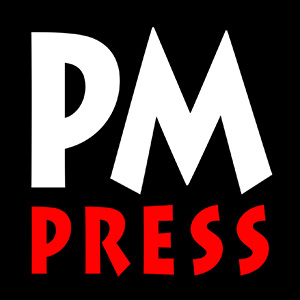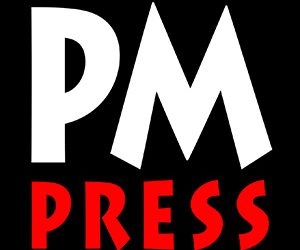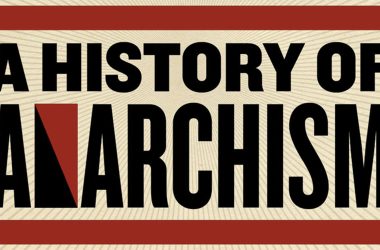The anarchist USA publisher PM Press tell us what motivates them to publish books which are “progressive, unabashedly lefty and even revolutionary”.
By Martin Cornwell
Quadrapheme
June 14th, 2014
PM Press was co-founded in 2007 by Ramsey Kanaan, a veteran of the ‘70s punk rock scene and organiser of anarchist book fairs. Based in Oakland, California, it’s a hard-working and fiercely independent operation whose range of output is as broad as its motivation is singular. A browse of its online store shows not just the publisher’s staple stock of literature and non-fiction books, but much else besides. Graphic novels, CDs, videos and DVDs, and even PM-branded merchandise such as posters and T-shirts are all up for grabs. It might all seem a bit muddled if it weren’t for the political and creative idealism that threads it all together.
“A radical spirit is crucial,” Kanaan tells me during a visit to London to promote Futures, the new novel by John Barker, “but so is an enquiring mind, and an accessible writing style. In one sense, it’s a given that we publish books that are progressive, unabashedly lefty and even revolutionary. But more than that, we strive to actually publish and disseminate really good books, content-wise and aesthetically.”
Kanaan seems relaxed about describing PM as an anarchist project, and I’m glad about that. ‘Anarchy’ must be one of the most misunderstood and misapplied words in the English language. Practically speaking, anarchism has very little to do with the stereotypical images of wanton destruction (although, like all stereotypes, it may contain an unfortunate grain of truth; Churchill’s statue didn’t give itself that green mohawk). More often it’s about co-operation, self-reliance and freedom from traditional organisational systems—in this case, freedom from the corporate publishing industry.
“As someone who came out of the punk/so called DIY underground, I agree absolutely,” says Kanaan. “DIY, of course, is a complete misnomer, since we weren’t—and aren’t—doing it ourselves. We’re actually doing it together, in concert with others. We like good old fashioned concepts like solidarity and mutual aid. PM Press is a political project as much as a literary one, so we’re as much a reaction to capitalism and the state as we are to the legion of negatives involved in corporate publishing.”
With its rejection of profit as motive, it’s safe to assume that PM can’t offer its authors the kind of eye-watering advances that are still occasionally forked out by the big publishing houses. But that doesn’t mean it’s in any way an amateur outfit. In accordance with its aesthetic concerns, PM’s books are finely-crafted artefacts in their own right. They often also feature the work of major mainstream authors: I discovered PM through The Wild Girls by Ursula le Guin, who is one of the most important writers of the last fifty years in any genre.
Despite existing as a kind of antidote to traditional publishing, PM faces the same challenges as the rest of the industry. Kanaan is very aware of this. “Undoubtedly, in this age of hyperlinks, texts, short attention spans and instant gratification, not only is reading and writing increasingly an anachronism, but in particular, long-form reading and study is an endangered species.”
But, equally, the combination of pragmatism and idealism that has got them this far means he’s optimistic about PM’s future. He describes the job of a good publisher as “editorial and curatorial”—a crucial service in a world where self-publishing, while democratising the creative process, also drops the reader in an unnavigable sea of content. As Kanaan puts it, “we help produce the nuggets of the good stuff, amongst an ocean of garbage, and help make them known.”






